2017_2018学年七年级英语下册Unit2Whattimedoyougotoschool教案(新版)人教新目标版
人教七年级下册Unit2Whattimedoyougotoschool知识点总结
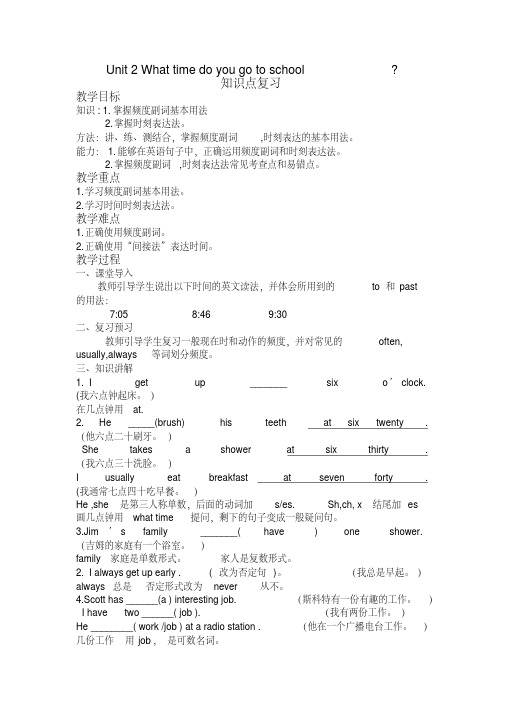
_______( have
)
one
shower.
(吉姆的家庭有一个浴室。 )
family 家庭是单数形式。
家人是复数形式。
2. I always get up early .
( 改为否定句 )。
(我总是早起。 )
always 总是 否定形式改为 never 从不。
4.Scott has ______(a ) interesting job.
and_____________(vegetable )
for lunch.
(十二点钟,她午餐吃许多水果和蔬菜。 )
许多 a lot of = lots of
可数不可数都可以用。
much 修饰不可数名词
many + 可数名词的复数形式。 )
20. After lunch , she sometimes ______(play ) volleyball.
do 是助动词,两个 do 都不能去掉。
用了 does, 后面的动词用原形。
18. I _____watch TV or play computer games in the evening .
(我晚
上要么看电视要么玩电子游戏。 )
Either you or he ________(clean ) the classroom.
for breakfast .
Don ’ t have = have no 没有。
时间 time 是不可数名词名词。
( 我没有许多时间吃早餐。 )
15. He eats a ________(good ) breakfast .
( 他吃好的早餐。 )
I play ping-pong _______(good ).
2017-2018学年七年级英语下册 Unit 2 What time do you go to s
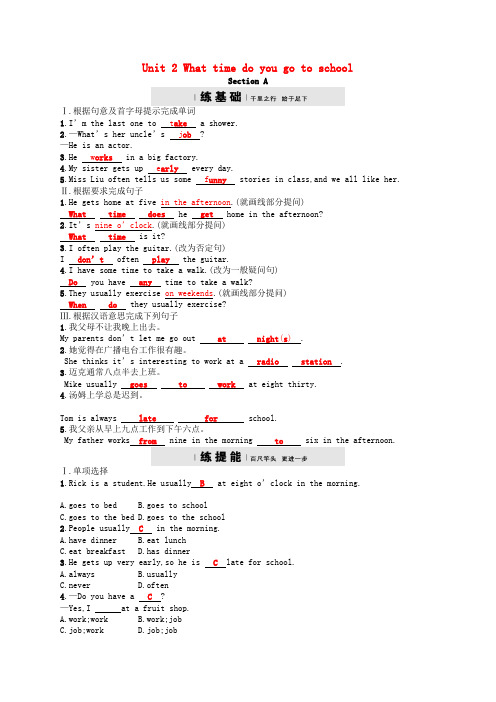
Unit 2 What time do you go to schoolSection AⅠ.根据句意及首字母提示完成单词1.I’m the last one to t ake a shower.2.—What’s her uncle’s j ob?—He is an actor.3.He w orks in a big factory.4.My sister gets up e arly every day.5.Miss Liu often tells us some f unny stories in class,and we all like her. Ⅱ.根据要求完成句子1.He gets home at five in the afternoon.(就画线部分提问)What time does he get home in the afternoon?2.It’s nine o’clock.(就画线部分提问)What time is it?3.I often play the guitar.(改为否定句)I do n’t often play the guitar.4.I have some time to take a walk.(改为一般疑问句)Do you have any time to take a walk?5.They usually exercise on weekends.(就画线部分提问)When do they usually exercise?Ⅲ.根据汉语意思完成下列句子1.我父母不让我晚上出去。
My parents don’t let me go out at night(s) .2.她觉得在广播电台工作很有趣。
She thinks it’s interesting to work at a radio station.3.迈克通常八点半去上班。
Mike usually goes to work at eight thirty.4.汤姆上学总是迟到。
unit2 what time do you go to school- 七年级英语下册同步必背知

Unit 2 What time do you go to school?七年级英语下册必备知识清单一、词汇知识清单I、课标词汇[注意英译汉]up [ʌp] adv.向上get up起床;站起dress ['dres] v.穿衣服n.连衣裙get dressed穿上衣服brush [brʌʃ] v.刷;刷净n.刷子tooth [tuːθ] n. (pl. teeth[tiːθ])牙齿shower ['ʃaʊə] n.&v.淋浴; n.淋浴器(间)take a shower淋浴;洗澡usually ['juʒuəli] adv.通常地;一般地forty ['fɔː(r)tɪ] num.四十wow [waʊ] interj.(表示惊奇或敬佩)哇;呀never ['nevə] adv.从来;绝不early ['ɜːlɪ] adv.&adj.早(的)fifty ['fɪftɪ] num.五十job [dʒɒb] n.工作;职业work [wɜːk] n.&v.工作station ['steɪʃ(ə)n] n.电(视)台;车站radio station广播电台o'clock adv.(表示整点)……点钟night [naɪt] n.晚上;夜晚funny ['fʌnɪ] adj.奇怪的;滑稽好笑的exercise ['eksəsaɪz] v.&n.锻炼;练习on weekends(在)周末best [best] adj.最好的adv.最好地;最group [gruːp] n.组;群half [hɑːf] n.&pron.一半;半数past [pɑːst] prep.晚于;过(时间)adj.过去的quarter ['kwɔːtə] n.一刻钟;四分之一homework ['həʊmwɜːk] n.家庭作业do (one’s) homework做作业run [rʌn] v.跑;奔clean. [kliːn] v.打扫;弄干净;adj.干净的walk [wɔːk] n.&v.行走;步行take a walk散步;走一走quickly ['kwɪklɪ] adv.很快地either ['aɪðə] adv.或者;也(用在否定词组后)either…or…要么……要么……;或者……或者……lot [lɒt] pron.大量;许多lots of大量;许多sometimes [ˈsʌmtaɪmz] adv.有时taste [teɪst] v.有…的味道;品尝;n..味道;life [laɪf] n.(pl. lives [laɪvz])生活;生命II、语法词汇知其变[注意词性变化]1.dress['dres] v.穿衣服--- adj.dressed穿好衣服的;穿着……衣服的---n.dresser梳妆台;化妆师2.brush [brʌʃ] v.刷;刷净n.刷子---ing形式brushing---pl.brushes3.tooth [tuːθ] n.牙齿--- pl.teethually ['juʒuəli] adv.通常地;一般地ual通常的,平常的5.work [wɜːk] n.&v.工作---3pl.works---ing形式working6.funny ['fʌnɪ] adj.奇怪的;滑稽好笑的---n.fun乐趣,享受7.exercise ['eksəsaɪz] v.&n.锻炼;练习---3pl.exercises---ing形式exercising8.best [best] adj.最好的adv.最好地;最---(原级)adj.good好的,优良的---(原级)adv.well有益的;合理的9.half [hɑːf] n.&pron.一半;半数---pl.halves10.quarter ['kwɔːtə] n.一刻钟;四分之一---pl.quarters11.run [rʌn] v.跑;奔---ing形式running---n.runner跑步者12.clean. [kliːn] v.打扫;弄干净;adj.干净的---ing形式cleaning---n.cleaner清洁工;清洁剂13.walk [wɔːk] n.&v.行走;步行---ing形式walking---n.walker步行者14.quickly ['kwɪklɪ] adv.很快地---adj.quick迅速的,快的15.sometimes [ˈsʌmtaɪmz] adv.有时---adv.sometime某个时候16.life [laɪf] n.生活;生命---pl.livesIII、重点短语知搭配[注意固定短语的英汉互译]get up起床get dressed穿上衣服take a shower洗淋浴radio station广播台on weekends在周末what time什么时间go to school去上学do one’s homework做某人的家庭作业take a walk散步either…or…要么……要么……;或者……或者……lots of…= a lot of很多;大量brush (my) teeth刷(我的)牙get to到达go home回家eat breakfast吃早餐go to work去上班get home到家go to bed上床睡觉at night在晚上be late for迟到IV、核心单词知用法[注意固定短语、句型和词块]Section A1. What time do you usually get up? 你通常什么时候起床?(P. 7)When do you go to work? 你的朋友们什么时候锻炼?(P. 8)(1)what time意为“何时;什么时候”。
初中英语人教版七年级下Unit 2 What time do you go to school知识点
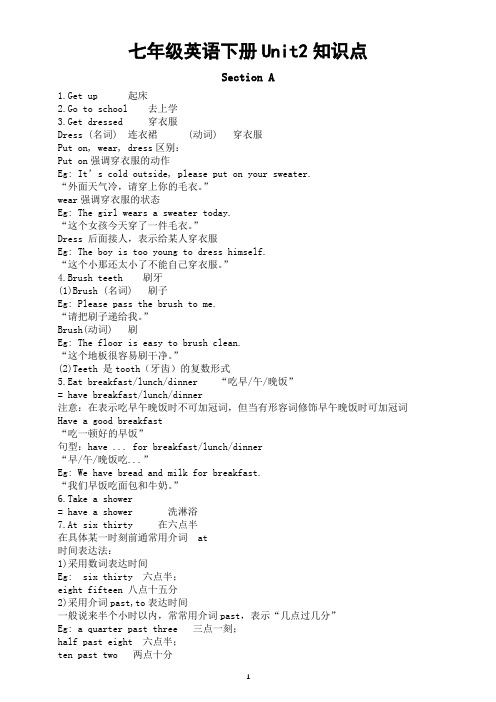
七年级英语下册Unit2知识点Section A1.Get up 起床2.Go to school 去上学3.Get dressed 穿衣服Dress (名词) 连衣裙 (动词) 穿衣服Put on, wear, dress区别:Put on强调穿衣服的动作Eg: It’s cold outside, please put on your sweater.“外面天气冷,请穿上你的毛衣。
”wear强调穿衣服的状态Eg: The girl wears a sweater today.“这个女孩今天穿了一件毛衣。
”Dress 后面接人,表示给某人穿衣服Eg: The boy is too young to dress himself.“这个小那还太小了不能自己穿衣服。
”4.Brush teeth 刷牙(1)Brush (名词) 刷子Eg: Please pass the brush to me.“请把刷子递给我。
”Brush(动词) 刷Eg: The floor is easy to brush clean.“这个地板很容易刷干净。
”(2)Teeth 是tooth(牙齿)的复数形式5.Eat breakfast/lunch/dinner “吃早/午/晚饭”= have breakfast/lunch/dinner注意:在表示吃早午晚饭时不可加冠词,但当有形容词修饰早午晚饭时可加冠词Have a good breakfast“吃一顿好的早饭”句型:have ... for breakfast/lunch/dinner“早/午/晚饭吃...”Eg: We have bread and milk for breakfast.“我们早饭吃面包和牛奶。
”6.Take a shower= have a shower 洗淋浴7.At six thirty 在六点半在具体某一时刻前通常用介词 at时间表达法:1)采用数词表达时间Eg: six thirty 六点半;eight fifteen 八点十五分2)采用介词past,to表达时间一般说来半个小时以内,常常用介词past,表示“几点过几分”Eg: a quarter past three 三点一刻;half past eight 六点半;ten past two 两点十分半小时过后多用介词to,表示“差几分到几点”Eg: a quarter to three 两点四十五;twenty to four 三点四十3)a. m. 和p. m.A.m. 表示“午前;上午”(午夜12:00后至中午12:00前);p.m. 表示“午后;下午”(中午12:00后至午夜12:00前)。
人教版七年级下册英语:Unit 2 What time do you go to school知识点讲解及练习题目及答案
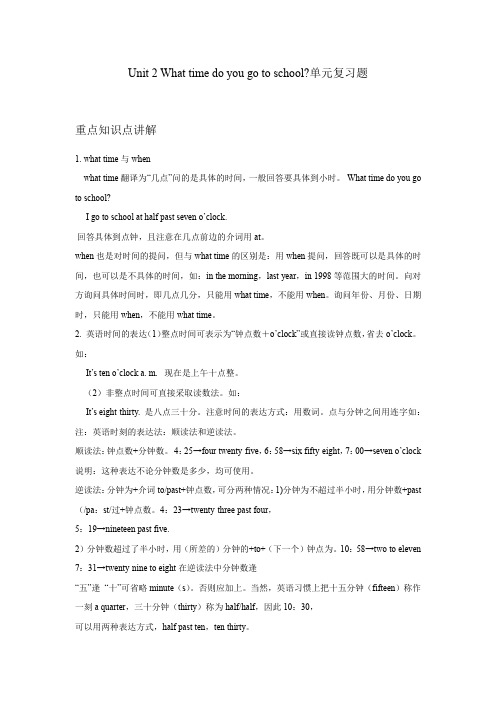
Unit 2 What time do you go to school?单元复习题重点知识点讲解1. what time与whenwhat time翻译为“几点”问的是具体的时间,一般回答要具体到小时。
What time do you go to school?I go to school at half past seven o’clock.回答具体到点钟,且注意在几点前边的介词用at。
when也是对时间的提问,但与what time的区别是:用when提问,回答既可以是具体的时间,也可以是不具体的时间,如:in the morning,last year,in 1998等范围大的时间。
向对方询问具体时间时,即几点几分,只能用what time,不能用when。
询问年份、月份、日期时,只能用when,不能用what time。
2. 英语时间的表达(1)整点时间可表示为“钟点数+o’clock”或直接读钟点数,省去o’clock。
如:It’s ten o’clock a. m.现在是上午十点整。
(2)非整点时间可直接采取读数法。
如:It’s eight-thirty. 是八点三十分。
注意时间的表达方式:用数词。
点与分钟之间用连字如:注:英语时刻的表达法:顺读法和逆读法。
顺读法:钟点数+分钟数。
4:25→four twenty-five,6:58→six fifty-eight,7:00→seven o’clock 说明:这种表达不论分钟数是多少,均可使用。
逆读法:分钟为+介词to/past+钟点数,可分两种情况:1)分钟为不超过半小时,用分钟数+past (/pa:st/过+钟点数。
4:23→t wenty-three past four,5:19→nineteen past five.2)分钟数超过了半小时,用(所差的)分钟的+to+(下一个)钟点为。
10:58→two to eleven 7:31→twenty-nine to eight在逆读法中分钟数逢“五”逢“十”可省略minute(s)。
七年级英语下册Unit2Whattimedoyougotoschool说课稿新版人教新目标版

Unit 2 What time do you go to school一、说教材(一)教材分析:1、教材简析:人教版《新目标英语》七年级下册第二单元中心话题是通过对日常生活作息时间的谈论,让学生学会时间的表达法.主要学习用what time和when来引导的特殊疑问句询问时间的标准用法,还有不同时间段的表达法以及表示频率副词的学习。
通过本单元的学习使学生学会不同时间段的表达法,学会用频率副词谈论自己日常生活习惯.通过对不同时间段的系统学习和理解,学会调整和安排自己的学习和课外活动时间,能够运用所学知识对某一活动进行合理的安排;使学生深刻理解时间的重要性,学会珍惜时间,并逐步养成良好的作息习惯.2、教学目标(知识目标、能力目标、德育目标)知识与能力:(1)掌握Section A 1a—2c和Section B 2a出现的单词和短语:time, what time, usually, get up, go to school, go home, shower, take a shower, do one’s homework, go to bed(2)掌握运用重点句型:What time do you usually get up; I usually get up at six o’clock/six thirty。
What time does she/he usually get up; She/He usually gets up at six o'clock/six thirty.过程与方法:通过运用英语正确表达时间和谈论日常作息安排,提高学生的综合语言运用能力。
情感、态度与价值观:通过学习,使学生充分认识时间的重要性,让学生养成良好的作息习惯和培养学生珍惜时间的优良品质。
确立教学目标的依据:以《英语课程标准》为理论依据,通过听、说、读、写四项基本语言技能的训练,激发学生的学习兴趣,帮助学生树立自信心和建立学习成就感,使他们在语言学习实践过程中发展综合运用能力.此外,根据教学内容,把培养学生的情感融化到日常教学当中。
英语七年级下册语法Unit2What-time-do-you-go-to-school

Unit 2 What time do you go to school ? 一.What time 什么时候,几点钟。
常用于对具体的(确切的)时间提问,也可用when来替换,但反之不一定行。
1. What time/ When do you get up in the morning?I get up at six o’clock in the morning.2. What time is it ? / What’s the time ?It’s six-thirty. / It’s half past six.二.★关于时间的表达法:顺读法,逆读法。
1. 顺读法:按汉语的习惯,先说点后说分的方法。
结构:点+分。
5:10 five-ten 8:30 eight-thirty9:46 nine forty-six 1:05 one-five整点的读法:基数词+o’clock7:00 seven o’clock 12:00 twelve o’clock2. 逆读法:借助介词past或to, 先说分后说点的方法,其结构为:分+past/to +点past 过to 差①当分钟数小于或等于30分钟时,用介词past表示。
7:05 five past seven 6:30 thirty past six =half past six30 thirty=half an hour 11:25②当分钟数大于30时,用介词to表示:几点差几分。
其结构为:(60-分)+to +(点+1)11:50 ten to twelve 9:45 fifteen to ten =a quarter to ten7:55 3:35hour 小时minute 分second 秒quarter 一刻钟写出同义句:seven thirty = ____ ____ seven eight forty = ____ ______ nine 三.★感叹句What a funny time to eat breakfast !What a lucky guy!定义:表示喜怒哀乐等强烈感情的句子叫感叹句。
2017年人教版初中英语七年级英语下册知识点及练习题Unit2 what time do you go to school

教师辅导讲义教学内容新课知识◆短语归纳起床 3. get up 2. go to school 去上学1. what time 几点4. take a shower 洗淋浴6. get to 到达5. brush teeth 刷牙9.go home 回家8. go to work 去上班7. do homework 做家庭作业到家10. have/eat breakfast 吃早饭11. get dressed 穿上衣服12.get home15.get dressed 穿上衣服上床睡觉…14. go to bed 13. either…or…要么…要么散步18. take a walk 17.radio station 广播电视台16.go to school 去上学21. be late for=arrive late for 迟到19. lots of=a lot of 许多,大量20. at night 在晚上返回24.go back 23.go on 继续22.go shopping 去购物晚上/下午/ 25. go away 离开26. in the morning/ afternoon/ evening 在上午25.go over 仔细检查◆用法集萃1. at + 具体时间点在几点(几分)吃早饭/午饭/2. eat breakfast/ lunch/dinner 晚饭……点半3. thirty\half past +基数词差一刻到……点4. fifteen\a quarter to +基数词5. take a/an +名词从事……活动从……到…… 6. from …to …需要做某事7. need to do sth ◆典句必背1. —What time do you usually get up? 你一般什么时候起床?分起床。
I usually get up at six thirty. —我通常6:30 这是一个可笑的早餐时间。
七年级英语下册Unit2Whattimedoyougotoschool短语语法知识点汇总人教版
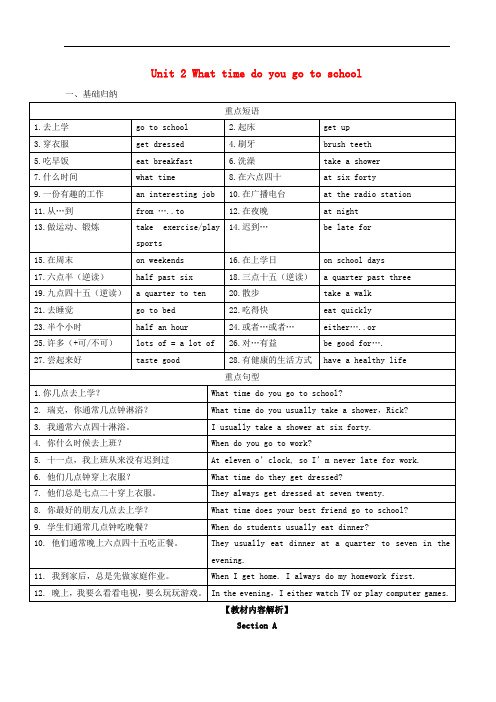
Unit 2 What time do you go to school 一、基础归纳【教材内容解析】Section A1.get dressed (P. 7)get dressed意为“穿上衣服”,dress用作动词,表示“给(某人)穿衣服”,接宾语时,只能接表示人的名词或者代词。
He can’t dress himself.I usually dress my daughter before I go to work.【拓展】辨析wear, put on和dress2.take a shower (P. 7)take a shower意为“洗淋浴”,相当于have a shower,shower用作名词,表示“淋浴”。
I often take a shower in the evening.I take a cold shower when I feel tired.3.What time do you usually get up, Rick? (P. 7)(1)what time用来询问具体的时间点,表示“什么时候”。
What time do you go to school?(2)usually是频度副词,意为“通常、一般”,在句中作状语,一般位于实义动词之前,连系动词be、助动词或者情态动词之后。
I usually have lunch at school.He usually goes to school by bike.4.I never get up so early. (P. 8)early此处用作副词,表示“很早地”,反义词为late,意为“晚地”。
Please come to school early tomorrow.【拓展】early还可以用作形容词,表示“早的、提前的”,反义词是late,意为“晚的”。
He gets up early to catch the early bus.5.Scott has an interesting job. (P. 8)job用作可数名词,表示“工作”,强调具体的职业或者工作,work表示“工作”时,用作不可数名词,指人们日常生活和工作中从事的体力或者脑力劳动,及各类工作。
七年级下册unit2Whattimedoyougotoschool知识点讲解及练习

1.What time do you get up"释:这是一个由疑问词what time(几点)引导的特殊问句。
其结构:What time +助动词do/does +主语+动词原形,询问某人做某事的具体时间。
例如:what time do you begin class in the morning"你们早晨几点开课?注:What’s the time=What time is it"也是用来询问时间,意为“几点了”。
用it作答。
例如:What’s the time" It’s 7:30.几点了?七点半了。
2.I usually get up at five o’clock. 我通常在五点钟起床。
释:1)句中usually与often 一样都是频度副词,常用于动词be 之后,行为动词之前。
always意思是“总是”、“永远”,表示动作重复,状态继续,中间没有间断,通常用来修饰动词的一般时态。
例如:We always get up before six o'clock.我们总是六点前起床。
若修饰动词进行时,则有“老是”,“再三地”的意思,带有厌烦、不满、赞美等感情色彩。
例如:You are always ing late.你老是迟到。
(含有责备的意思)He is always thinking of others.他总是想着别人。
usually(75%)意为“通常”,着重表示已习惯的动作。
反义词为:unusually。
例如:They usually have four classes in the morning.他们上午通常上四节课。
They usually do some shopping on Sunday.他们通常星期天买东西。
often(50%)意为“时常”、“经常”,表示常常这样,但不总是这样,反义词为:seldom。
例如:She often helps her mother with her housework after school.放学后她常常帮助母亲做家务。
2017_2018学年七年级英语下册Unit2Whattimedoyougotos

Tom 20:30
Nancy 21:10
Lucy 22:10
Xiao Ming
20:40
Can you line up from the earliest to the latest
bedtime?
What time do they usually get up?
Xiao Ming 7:40
Tom 8:10
What time does he usually take a shower? He usually takes a shower at …
eat breakfast
What time does she usually eat breakfast? She usually eats breakfast at …Leabharlann TokyoParis
p.m. Los Angeles New York
London
It’s 7 :15 seven-fifteen
Beijing a.m.
Tokyo
Paris
p.m. Los Angeles New York London
get up
run
eat breakfast go to school
Unit 2
What time do you go to school?
Section A Period 2 (3a – 3c)
What time is it ?
What time is it ?
It’s 7 o’ clock.
7:00 a.m.
What time is it?
a.m. Beijing
3b Write about something you always do, something you usually do and something you never do.
七年级Unit_2_What_time_do_you_go_to_school知识点
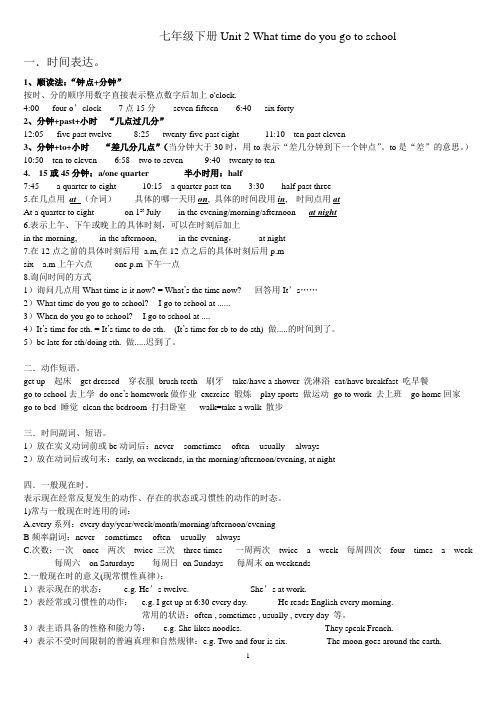
七年级下册Unit 2 What time do you go to school一.时间表达。
1、顺读法:“钟点+分钟”按时、分的顺序用数字直接表示整点数字后加上o'clock.4:00 four o’clock 7点15分seven fifteen 6:40 six forty2、分钟+past+小时“几点过几分”12:05 five past twelve 8:25 twenty-five past eight 11:10 ten past eleven3、分钟+to+小时“差几分几点”(当分钟大于30时,用to表示“差几分钟到下一个钟点”。
to是“差”的意思。
)10:50 ten to eleven 6:58 two to seven 9:40 twenty to ten4. 15或45分钟:a/one quarter 半小时用:half7:45 a quarter to eight 10:15 a quarter past ten 3:30 half past three5.在几点用at (介词)-- 具体的哪一天用on, 具体的时间段用in, 时间点用atAt a quarter to eight on 1st July in the evening/morning/afternoon at night6.表示上午、下午或晚上的具体时刻,可以在时刻后加上in the morning, in the afternoon, in the evening,at night7.在12点之前的具体时刻后用a.m,在12点之后的具体时刻后用p.msix a.m上午六点one p.m下午一点8.询问时间的方式1)询问几点用What time is it now? = What’s the time now? 回答用It’s……2)What time do you go to school? -- I go to school at ......3)When do you go to school? -- I go to school at ....4)It’s time for sth. = It’s time to do sth. (It’s time for sb to do sth) 做.....的时间到了。
人教版七年级英语下册Unit 2 What time do you go to school知识点归纳总结

Unit 2 What time do you go to school?◆短语归纳1. what time 几点2. go to school 去上学3. get up 起床 go to bed 上床睡觉(反义词get up )4. take a shower = have a shower 洗淋浴5. brush teeth 刷牙6. get to 到达7. do homework 做家庭作业 8. go to work 去上班(反义词 go home )9. go home 回家 10. eat breakfast 吃早饭 11. get dressed 穿上衣服12. get home 到家13. either…or… 要么…要么… 14. make breakfast 做早饭15. in the morning/ afternoon/ evening 在上午/下午/晚上 16. take a walk 散步17. lots of=a lot of 许多,大量 18. radio station 广播电台 19. at night 在晚上20. be late for=arrive late for 迟到21.make a shower schedule 做一个洗澡的安排22. have breakfast/dinner/lunch 吃早晚午饭 23.get to work 到达工作岗位24.practice guitar 练吉它25.leave home 离家26.go to class 上课27.take the Number 17 bus to the Hotel 乘17路公共汽车去旅馆◆用法集萃 ◆典句必背 1. What time do you usually get up? I usually get up at six thirty. 2. That’s a funny time for breakfast. 3. When do students usually eat dinner? They usually eat dinner at a quarter to seven in the evening.4. In the evening, I either watch TV or play computer games.5. At twelve, she eats lots of fruit and vegetables for lunch..6. She knows it’s not good for her, but it tastes good.7. Here are your clothes.◆语法1. at + 具体时间点 在几点(几分)2. eat breakfast/ lunch/dinner 吃早饭/午饭/晚饭3. thirty\half past +基数词 ……点半4. fifteen\a quarter to +基数词 差一刻到……点5. take a/an +名词 从事……活动6. from …to … 从……到……7. need to do sth 需要做某事8.around six o’clock 六点左右9.tell sb. about sth. 告诉某人某事 tell sb. to do sth. / tell sb. Sth. 10.know about sth. 知道某方面的情况 11.love to do/doing = like to do/doing 喜欢干某事 12.Listen to the early morning news on radio 听电台早间新闻 13.watch the early morning news on TV 看电视早间新闻1、英语时间的表达(1)整点时间可表示为“钟点数+o’clock”或直接读钟点数,省去o’clock。
人教版新目标七年级英语下册Unit2Whattimedoyougotoschool语法篇试题含答案

人教版新目标七年级英语下册Unit2Whattimedoyougotoschool语法篇试题学生通过本讲学习,能够掌握本单元的重点语法,并在综合能力上有一定的拓展。
一、what time与when1.what time翻译为“几点”问的是具体的时间,一般回答要具体到小时。
What time do you go to school?你什么时候/几点上学?I go to school at half past seven o’clock.我七点半去上学。
回答具体到点钟,且注意在几点前边的介词用at。
2.when也是对时间的提问,但与what time的区别是:用when提问,回答既可以是具体的时间,也可以是不具体的时间,如:in the morning,last year,in 1998等范围大的时间,例如:When does he take a shower?他什么时候洗澡?He takes a shower in the morning.他在早上洗澡。
也可用具体时间:I take a shower at 6 o’clock in the morning.我早上六点洗澡。
3. 问对方时间点只能用what time,如What time is it?二、频率副词的使用用法几个频率副词的用法★alwaysalways 意为“总是”,与进行时态连用时,可以表示赞扬,也可以表示讨厌等感情色彩。
e.g.(1)I shall always remember my first day at school. 我将永远记住我上学的第一天。
(2)He is always smoking. 他总是抽烟。
★usuallyusually可以指通常的动作,但是侧重已经形成的习惯,它是从已经形成的角度来说明动作。
e.g.(1)I usually do some shopping with my parents on Sundays. 我经常在星期天和我的父母一起去买东西。
- 1、下载文档前请自行甄别文档内容的完整性,平台不提供额外的编辑、内容补充、找答案等附加服务。
- 2、"仅部分预览"的文档,不可在线预览部分如存在完整性等问题,可反馈申请退款(可完整预览的文档不适用该条件!)。
- 3、如文档侵犯您的权益,请联系客服反馈,我们会尽快为您处理(人工客服工作时间:9:00-18:30)。
Unit 2 What time do you go to school?Section A (1a-2d)一、教学目标:1. 语言知识目标:1) 能掌握以下单词:up, get up, dress, get dressed, brush, tooth (pl. teeth) brush teeth, shower, takea shower, usually, forty, fifty, wow, never, early, job, work, station, radiostation, o'clock, funny, exercise能掌握以下句型:①—What time do you usually get up? —I usually get up at six thirty.②—When do you go to work? —I usually go to work at eleven o'clock.③—He has an interesting job. —He works at a radio station.2) 用when和what time引导的特殊疑问句询问时间和时间的表达法;用所学的目标语言对生活和学习活动做计划,学会合理地安排作息时间。
2. 情感态度价值观目标:本部分的话题是“日常作息时间”,学习内容贴近学生的生活,因为学生的作息时间安排是非常有规律的。
通过互相询问或谈论自己或对方的作息时间安排和活动计划,可以培养学生良好的作息习惯和守时习惯。
二、教学重难点1. 教学重点:1) 掌握时间的简单表达方式。
2) 学习询问和谈论时间和制订作息时间表。
2. 教学难点:when和what time引导的特殊疑问句和时间的表达法。
三、教学过程Ⅰ. Warming-up and revision1. Greet the Ss as usual.2. Watch a short video program about daily activities.Ⅱ. Presentation1. 出示几幅反映日常事务(如:起床、上学、跑步等)的图画、幻灯片或播放课件,引导学生谈论这些日常事务go to school,get up,run,take a shower,eat breakfast等,学习有关的动词短语。
学生们观看教师出示的反映日常事务(如:起床、上学、跑步等)的图画、幻灯片或课件,谈论这些日常事务go to school,get up,run,take a shower,eat breakfast等,学习有关的动词短语。
2. 出示la部分的图片或幻灯片或播放该内容的课件,引导学生将词语与图画进行搭配。
学生们观看1a部分的图片或幻灯片或该内容的课件,将词语与图画进行搭配,完成la部分的学习任务。
Ⅲ. Presentation1. 出示一个可以转动时/分针的大钟,一边调整时间,一边询问学生时间“What time is it?”。
学生们在老师的帮助下回答时间:It's six o'clock. It's seven twenty. …(给学生们解释在英语中时间的简单的表达方式)2. 调整时钟到某个时间,然后说:I get up at 6:00.I go to school at 6:45.等;再询问学生:What time do you get up? 等,引导学生回答,从而引出本部分的重点目标句型。
学生们一边观看大钟,一边认真听老师的描述,然后回答老师的问题I get up at…,从而学习本部分的重点目标句型。
Ⅳ. Listening1. 播放1b部分的录音让学生听,引导学生根据所听到的内容,将时间与活动进行搭配。
2. 学生们听1b部分的录音,根据所听到的内容,将时间与活动进行搭配,完成1b部分的学习任务。
3. Check the answers:Ⅴ. Pair work1. 引导学生展开Pairwork活动,进行口语交际活动,学会运用what time引导的疑问句,用数词来询问和表达时间。
2. 学生们展开活动,完成1c部分口语交际的学习任务,学会运用what time引导的疑问句,用数词来询问和表达时间。
Ⅵ. Listening1. 让学生们先阅读2a部分的句子,理解大意。
然后播放2a部分的录音让学生听,引导学生根据对话内容进行填空。
(注意提醒学生们听对话填空的技巧:先听、记住应填的内容,做简单的(符号)记录,最后,在听第二遍的时候再进行单词的书写。
)2. 再播放2a部分的对话录音让学生听,引导学生写出Jim一家人的淋浴计划(时间)。
3. 学生们再听2a部分的对话录音,写出Jim一家人的淋浴计划,完成2b部分的教学任务。
4. Check the answers:Ⅶ. Pair work引导学生展开Pairwork活动,完成2c部分口语交际的教学任务。
提示学生们可以就1a部分的日常活动来进行问答。
e.g.T: S1, what time do you usually get up in the morning?S1: I usually get up at six thirty.T: And what time do you eat breakfast?S1: I usually eat breakfast at seven o'clock.Ⅷ. Role-play1. Ask Ss to read the conversation in 2c. Then answer the questions below:① Where does Scott work?② What time is his radio show?③ What time does he usually get up?④ What time does he eat breakfast?⑤ What time does he usually go to work?2. 学生们阅读对话,然后回答上述问题。
老师让几位同学回答上述问题,然后和同学们一起校对一下答案。
看学生们的掌握情况。
应对话中学生们不明白的地方给予适当的解释。
3. Play the recording for the Ss to listen and repeat. Then let Ss work in pairs topractice reading the conversation. Then try to act it out.4. Ask some pairs to come to the front and act out the conversation. See which groupdoes best.Homework:1. Remember the new words and expressions. Try to understand how to express timein English.2. Role-play the conversation with a partner after class.3. Write three short conversations to ask about your best friend's daily activities.板书设计:Section A (Grammar Focus-3c)一、教学目标:1. 语言知识目标:1) 继续学习运用when和what time引导的特殊疑问句询问时间、运用数词表达不同的时间,通过对目标语言的学习使学生学会更合理地安排自己的学习和课活动时间。
能掌握以下句型:①—What time do you usually get up? —I usually get up at six thirty.②—When do you go to work?—I usually go to work at eleven o'clock. —He's never late for school.③—When does Rick eat breakfast? —He eats breakfast at seven o'clock.④—When do your friends exercise? —They usually exercise on weekends.2. 情感态度价值观目标:通过对该部分内容的学习,让学生们学会用频率副词谈论自己日常生活及日常作息习惯;学会更合理地安排自己的学习和课外活动时间;能够运用所学知识对某一活动进行合理安排,并培养学生良好的作息习惯和守时习惯。
二、教学重难点1. 教学重点:1) 总结归纳用频率副词谈论自己日常生活及日常作息习惯的句型。
2) 通过不同形式的练习方式来训练及熟练运用用频率副词谈论自己日常生活及日常作息习惯。
2. 教学难点:1) 总结归纳用频率副词谈论自己日常生活及日常作息习惯的句型。
2) 用频率副词来造句,表达日常作息习惯。
三、教学过程Ⅰ. Warming- up and revision1. Greet the Ss and check the home.2. Let some pairs role-play the conversation in 2d.Ⅱ. Grammar Focus.1. 下面是对用频率副词谈论自己日常生活及日常作息习惯的句型进行了总结。
同学们阅读Grammar Focus中的句子,然后做填空练习。
①你通常几点起床? _____________________②我通常六点半起床。
____________________③他们几点穿好衣服? ___________________④他们总是七点半穿好。
___________________⑤里克在几点钟吃早饭? ____________________…2. Ss finish off the sentences by themselves, then check the answers by themselves.3. Give Ss about some time to remember the sentences.4. 语法探究:Let Ss read the sentences on the big screen. Try to find the answers to the question.And try to learn about the grammar knowledge.①可以看出,询问做某事的时间时,可以用_____________和_______ 两个疑问词来询问。
